Thailand's Ministry of Health Pushes Dangerous HPV Vax on The Youth
"HPV vaccinations for schoolgirls stepped up"
Another day another injection pushed in Thailand. Always aimed at the youth. The beat drums on.
Comments got scrubbed by Bangkok Post moderators before I could save them this time.
The Ministry of Public Health will start offering the first dose of HPV
(Human papillomavirus virus) vaccine to prathom 5 (grade 5) schoolgirls on Dec 20 as protection against cervical cancer
.
Public Health Minister Somsak Thepsutin said the government is prioritising healthcare for teenagers and young women, with the HPV vaccine among its main initiatives.
The rollout of the HPV vaccine to prathom 5 is part of a wider voluntary HPV vaccination programme targeting females aged 11-20.
Injection campaigns beget more injection campaigns…
On Monday, the national disease control committee also agreed to step up vaccinations against measles, rubella and mumps in children aged up to 5years old in provinces where protection has fallen below 95%.
The Reach Out programme involves mobile vaccination units and a surveillance campaign to alert the ministry of any outbreaks, said Mr. Somsak.
PDF of article:
The timeline for HPV injections being ‘stepped up’ has been building for a few months in Thailand.
The National Health Security Office (NHSO) will likely replace its current two-dose human papillomavirus (HPV) vaccine with a cheaper, more effective vaccine in the next fiscal year, says Public Health Minister Somsak Thepsutin. He said the current two-dose vaccine is 60% effective against two strains of the virus -- HPV16 and HPV18 -- while its prospective cheaper single-dose replacement is 90% effective against nine strains.
PDF of article:
Safe and effective Safe and effective Safe and effective Safe and effective.
Numbers. Percentages. Belief systems. Trust in authority.
PDF of article:
Kayla Carrillo was 12 when she received the Gardasil HPV vaccine on Aug. 17, 2012. A happy, talented, physically active girl, Kayla enjoyed playing musical instruments and had early ambitions to study art.
Marlena Carrillo allowed her daughter Kayla to receive the Gardasil vaccine because she had seen numerous advertisements from Merck vouching for the vaccine’s safety and efficacy in preventing cervical cancer.
A day after the first injection, Kayla had a seizure-like episode which included a staring spell, facial swelling, slurred speech and a severe headache. She later developed severe migraine headaches, abdominal pain and a host of other debilitating health issues.
Five months after her first shot, Kayla experienced a seizure and was taken to the emergency room. Around this time, she was also coping with irregular menstrual problems, including heavy bleeding at the beginning of each cycle.
Her health continued to deteriorate after she received another dose of the Gardasil vaccine. Just two days after the second shot, Kayla collapsed during P.E. class and was rushed to the emergency department of Children’s Hospital of Orange County.
This is the seventh Gardasil lawsuit Baum Hedlund and I have filed against Merck challenging the company’s dangerous and defective HPV vaccine for causing severe and life changing injuries.
In addition to Kayla’s case filed this week, we have filed cases on behalf of Michael Colbath of California, Sahara Walker of Wisconsin, Zach Otto of Colorado, Julia Balasco of Rhode Island and two others.
While each case is unique, they share common threads: All of our clients were happy, healthy, bright, active kids with unlimited potential until they received the Gardasil HPV vaccine.
We look forward to getting these cases in front of a jury as soon as possible.
PDF of article:
Back in the good old days when Bobby was shouting about injection harms, before he switched over to the MAHA fruit loops PSYOP…
Why is it that these injections only seem to be ‘safe’ at providing legal immunity to the manufacturers? Why is it that these injections only seem to be ‘effective’ at maiming, sterilising, and killing people?
Craig Pardekooper documented HPV injection harms in detail:
Some Side Effects of the HPV Vaccine
what you can expect following mass vaccination of school children
by Craig Paardekooper
•
4,486,467 individual people records
•
14,987,664 drug-symptom associations
•
19,247 unique symptoms
•
1,504 unique drug brand names, and
•
3,163 unique ingredient lists.
•
Each drug is represented by a name consisting of a single word
This dataset enables us to rank drugs by the incidence of any adverse symptom. In this document I look at symptoms associated with the HPV vaccines – GARDASIL, GARDASIL 9, and CERVARIX.
AUTHENTICITY OF EACH RECORD
Each record in the dataset has an ICSR, meaning an “Individual Case Safety Report” – each report being a unique person. There are 4,486,467 reports in the final dataset.
If you input the ID number into the URL below, then you can view the report on the EMA website.
In this example, the URL is for the report with ID 10011128660. It is a pdf hosted on the European Medical Association website.
This shows that the data is not made up. Rather, each row of data has a report that you can verify using the link provided.
Each downloaded report looks like this –
63% of reports were submitted by healthcare professionals, and a further 35% of reports were submitted by non-healthcare professionals - admin staff in the employ of hospitals, private medical practices, or care services. So this data is to be taken seriously.
Results
Table1 : PRR Rates for each symptom
PRR > 2 = reported incidence is more than 2 x that for other drugs.
PRR > 3 = reported incidence is more than 3 x that for other drugs.
PRR > 4 = reported incidence is more than 4 x that for other drugs.
HPV vaccines such as GARDASIL, GARDASIL 9 and CERVARIX are associated with a process called demyelination.
All nerve fibers (axons) are surrounded by an insulating layer called a myelin sheath. Demyelination is where this myelin sheath is attacked by your own immune system causing and nerve signal transmission to be disrupted – leading to motor, sensory and cognitive disorders.
The results of demyelination are –
1.
Cognitive disorders – such as disturbance of attention, memory impairment, mental impairment, speech disorders
2.
Motor disorders – such as transverse myelitis, impaired work ability, disability, motor dysfunction, multiple sclerosis, tremor, palsy
3.
Brain disorders – encephalitis, may also impact visual, auditory and tactile nerves.
PRR measures the incidence rate relative to other drugs. In this section I show the absolute incidence rates for reported symptoms.
The most commonly reported symptoms following HPV vaccination are movement disorders such as seizures, tremors, paralysis, Guilain-barre and multiple-sclerosis. Commonly reported cognitive symptoms include attention deficit, memory impairment.
Teachers should watch out for these symptoms occurring in HPV vaccinated school children. Please keep a record of such incidents, and report them immediately to your school head-master or head-mistress. Individual case details can also be submitted to craig@howbad.info
Table 2 : Incidence Rates (Incidence rates will increase with multiple doses)
PDF of fact sheet:
Draw your own conclusions.
Nicholas Creed is a Bangkok based writer. Any support is greatly appreciated. If you are in a position to donate a virtual coffee or crypto, it would mean the world of difference. Paid subscribers can comment on articles, videos, and podcasts, and also receive a monthly subscriber newsletter.
Email: nicholas.creed@protonmail.com with information and newsworthy stories for open source intelligence gathering to support this Substack, thank you.
Bitcoin address:
bc1p0eujhumczzeh06t40fn9lz6n6z72c5zrcy0are25dhwk7kew8hwq2tmyqj
Solana address:
Ds6QpUxaWB6bJ8WF4KAazbuV25ZhPRdZh4q4BXutj4Ec
Ethereum address:
0x42A7FA91766a46D42b13d5a56dC5B01c153F1177
Monero address:
86nUmkrzChrCS4v5j6g3dtWy6RZAAazfCPsC8QLt7cEndNhMpouzabBXFvhTVFH3u3UsA1yTCkDvwRyGQNnK74Q2AoJs6




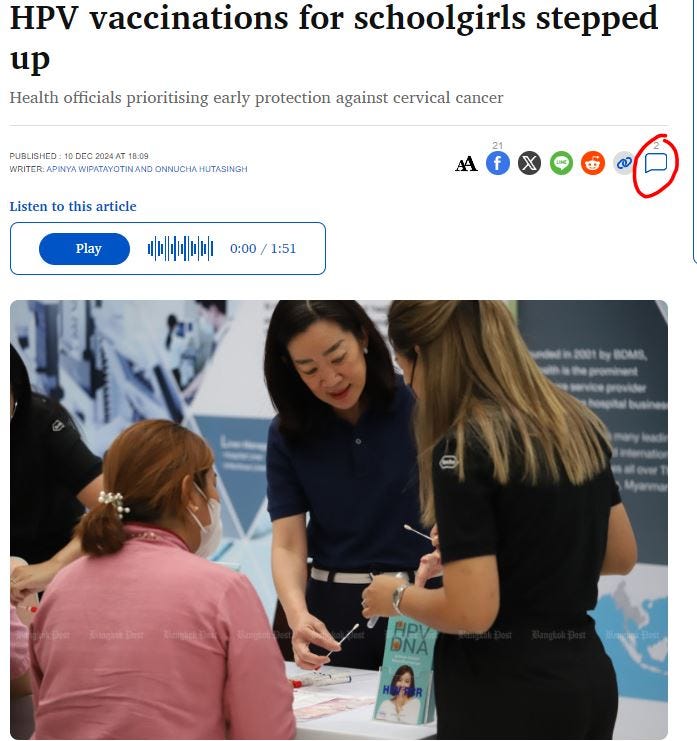

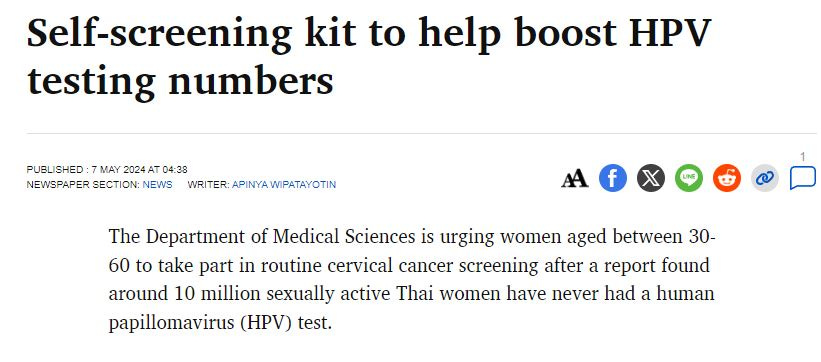
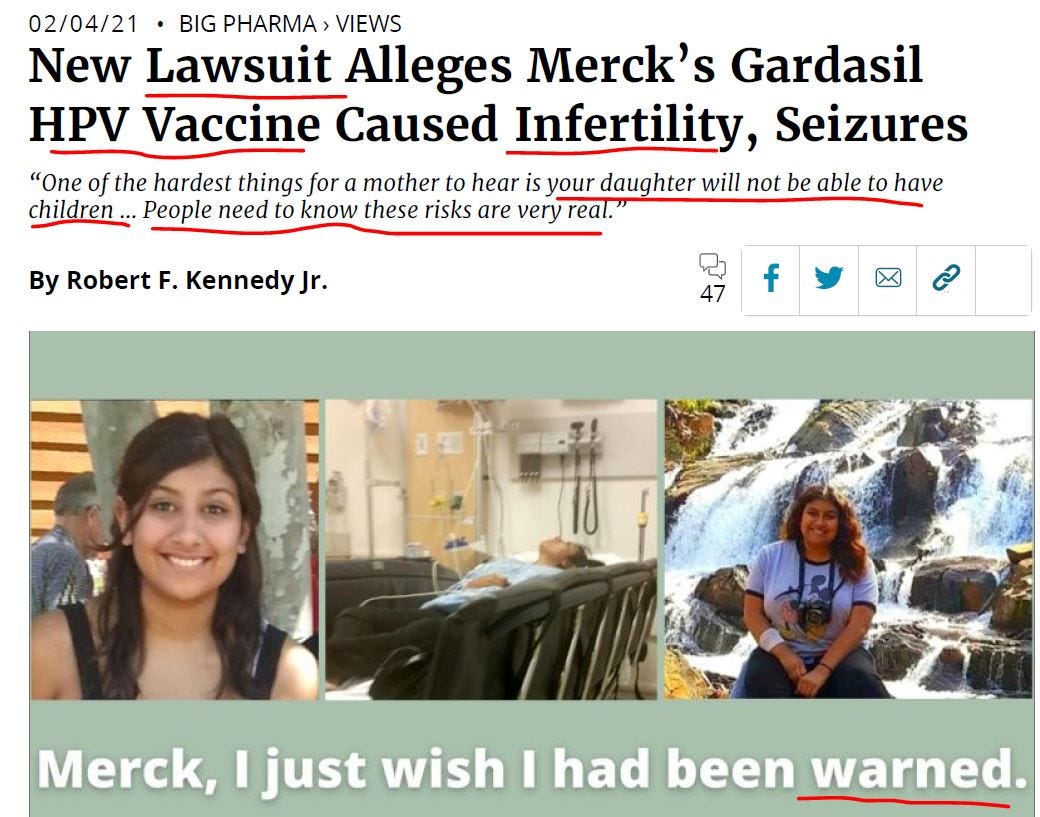
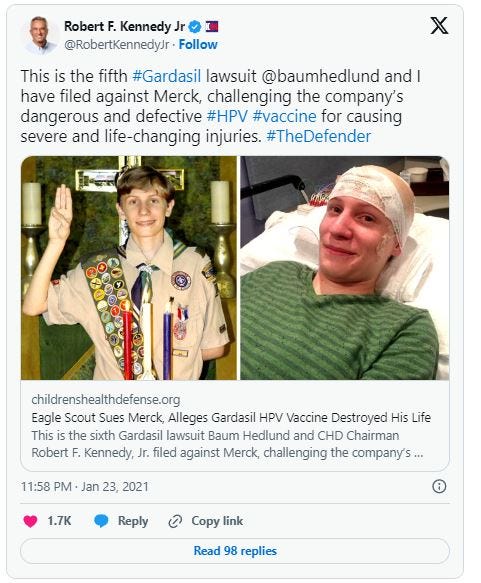


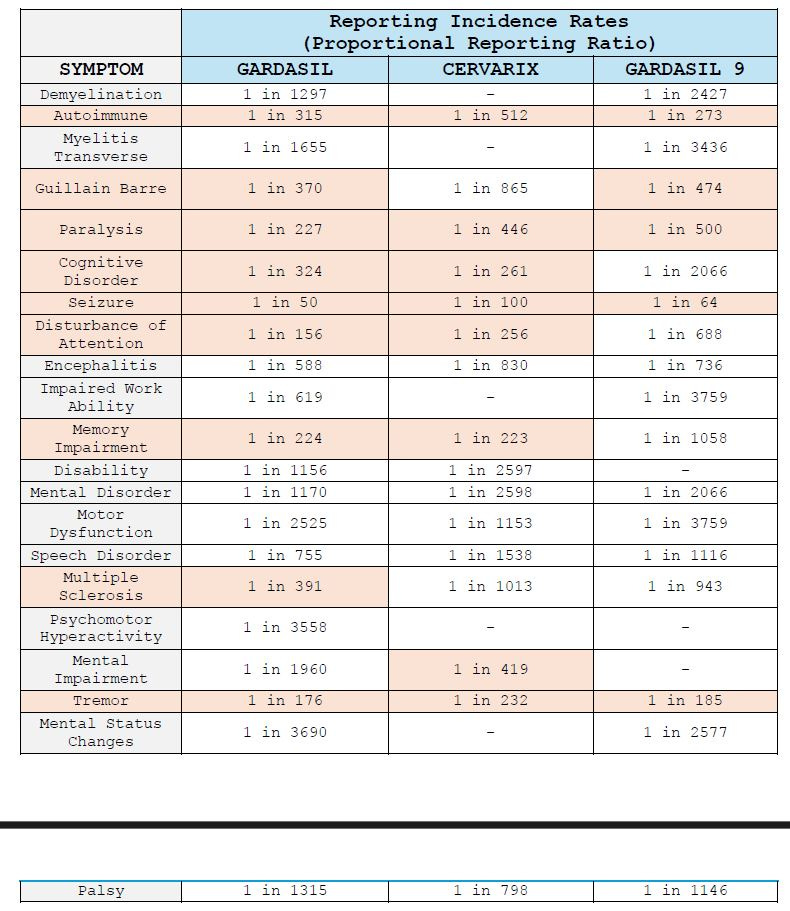

When it comes to the decision on whether to take a drug or not, people need to understand the difference between relative risk reduction and absolute (actual) risk reduction, and by "people" I include doctors. Efficacy results from clinical trials (to the extent that they're conducted) are almost always presented solely in relative risk reduction terms. Drug companies and their shills leave out ARR for a reason: It's very often proof of worthlessness, or at least would completely change the way people weigh the benefits and risks of taking a given drug.
Pfizer's "covid" shots were advertised as being 95% effective, but that's in terms of relative risk. The absolute risk reduction was just .84%. Not very compelling. Reporting RRR alone ignores the likelihood of getting the fake disease in the first place. If there's virtually no chance of dying from a fake cold (absolute risk), that makes the RRR look better, which is why drugs are almost always marketed without that context.
I don't know what the statistics say about the risk to girls and women from cervical cancer. I doubt it's high enough to require a "vaccine" as opposed to regular screening exams, and I'm pretty sure the risk can be minimized further with a policy of not letting guys use you like an old gym sock. Of course the drug companies and their shills won't benefit from that, which is why doctors promote jabs instead of self-respect and a little discretion.